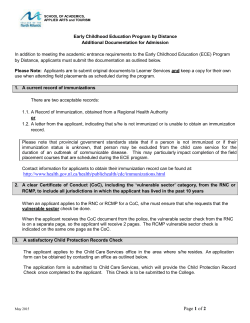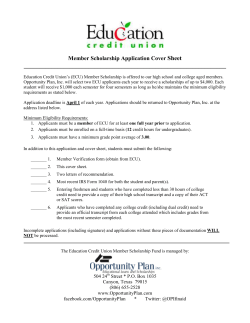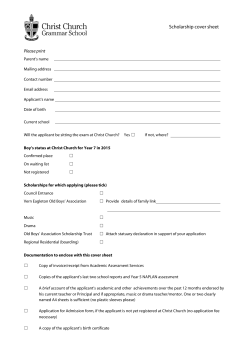
Faculty Course Redesign Grant (click here for more information)
CALL FOR PROPOSALS – 2015-16 FACULTY GRANTS FOR SOCIAL JUSTICE COURSE RE-DESIGN The Social Justice Institute of Case Western Reserve University (SJI) invites applications from faculty who wish to re-design a course currently in the undergraduate curriculum to include a significant focus on social justice. Successful applicants will receive a stipend of $2,500 to be spent on travel, materials, and/or research assistance needed for course redesign. AWARD CRITERIA Applicants must be regular faculty members who are tenured or in the tenure track or other faculty who can demonstrate long-term commitment to social justice at Case Western Reserve University. The award must be used during summer or fall 2015 for materials and/or research assistance needed to re-design an existing course that the applicant teaches or has previously taught. SJI strongly encourages the applicant to teach the redesigned course during the 2015-16 academic year, if possible. (See “Application Process” section below for more detail.) All re-designed courses will carry the SJUS designation as a “slash” designation, thus indicating that it is suitable for inclusion as part of the approved Social Justice Minor Program at CWRU. Award decisions will be based upon how well the application demonstrates the applicant’s ability and commitment to re-design an existing course to reflect the SJI curricular mission and criteria. The Social Justice curriculum prepares students across the university to address national and global inequities, emphasizing history, theory and practice of social justice; the distribution of power, resources and opportunities; and appropriate individual and collective remedies for social injustices. Through cross-disciplinary study, dialogue, research, active community engagement, and advocacy and leadership development, the curriculum promotes understanding of one’s place in and responsibility to community, country, and planet. A more comprehensive description of the criteria for inclusion within the Social Justice curriculum is contained in the attached document, entitled “Criteria for Inclusion as a Social Justice Curricular Elective.” Successful applicants will also have demonstrated a commitment to social justice in their teaching, scholarship/research, and/or service to the university and/or wider community. APPLICATION PROCESS Applicants should submit an electronic (PDF) version of their proposal describing how 1 they would use the funds if awarded and how the re-designed course will meet the requirements of the Social Justice curriculum. The proposal should be no more than three single-spaced pages in length. The proposal should also include a single budget page signed by the nominee's department chair (or an Associate Dean in those schools that do not have a departmental structure). The budget page is not included in the proposal's three-page limit. Specifically, the proposal should contain the following information: • A description of the existing course and the most recent term in which the applicant taught it; • A description of how the existing course could be re-designed to include a focus on social justice; • An explanation of how the re-designed course would fit with the mission of the Social Justice Minor Program (see the attached document, “Criteria for Inclusion as a Social Justice Curricular Elective”); • An explanation of how the re-designed course will meet at least four of the objectives required for inclusion within the Social Justice curriculum (see the attached document mentioned above), at least one of which must be number 6, 7, or 8; AND • A proposed time-line and justification for implementation of the course. (NOTE: SJI strongly encourages successful applicants to teach the re-designed course within two semesters of receiving the grant. However, SJI understands curriculum reviews and academic schedules vary across the schools and college.) Total budgets cannot exceed $2,500 and can contain provisions for travel expenses, purchase of educational materials and supplies, and/or student research assistance. Budget items must conform to the rules of the proposer's department and school. Please note that SJI’s approval of the budget is on the basis of its appropriateness in relation to the project and should not be taken as implying that the items conform to all the rules of the university. The applicant agrees to acknowledge the Social Justice Institute of Case Western Reserve University on all relevant presentations and publications. For example: The redesign (or innovation) of this course was made possible through funding provided by the Social Justice Institute of Case Western Reserve University. Questions may be sent to socialjustice@case.edu. The application must be submitted c/o Shelley White, Institute Administrator, via email to socialjustice@case.edu by 5:00 p.m. on Tuesday, March 17, 2015. Applications will be reviewed and selected by a subcommittee of the Social Justice Institute. Awards will be announced by the first week of May 2015. Awardees will be expected to make a presentation regarding the course redesign in a SJI-sponsored open forum during Spring 2016. 2 CRITERIA FOR INCLUSION AS A SOCIAL JUSTICE CURRICULAR ELECTIVE Each course should fit the following curricular MISSION The Social Justice Program prepares students across the university to address national and global inequities. The curriculum will emphasize history, theory and practice of social justice; the distribution of power, resources and opportunities; and appropriate individual and collective remedies for social injustices. Through cross-disciplinary study, dialogue, research, active community engagement, and advocacy and leadership development, the curriculum promotes understanding of one’s place in and responsibility to community, country, and planet. Courses to be included will fit under one of the following three concentration areas: (1) Social Movements and Social Change; (2) Ethics, Politics and Economics; and (3) Inequality and Discrimination. Each course will develop at least FOUR of the following OBJECTIVES: Through selection of elective courses in the three different concentrations, students will develop the following body of knowledge and set of values and skills: 1. Students will understand competing perspectives concerning diversity, equality, fairness and human rights in historical and contemporary local and global contexts. 2. Students will be presented a wide range of academic literatures focused on inequity, discrimination and exclusion based on age, (dis)ability, ethnicity, gender, immigration status, national origin, race, socio-economics, health status, educational experience, religion, and sexual identity. 3. Students will become familiar with the role of political and economic systems; power and privilege; and social movements in promoting change. 4. Students learn how cultural practices, social relations, social structures (e.g., the class system) and institutions (e.g., education, religion, business, medicine and law), can reproduce, reduce or eliminate inequalities. 5. Students will examine the disparate consequences of the social and physical environment and available resources on human development and wellbeing. 6. Students will develop skills to facilitate advocacy and leadership of social change from diverse community, academic, and professional perspectives. 7. Students will articulate their own understanding of social justice and increase their sensitivity in interactions with diverse others. This enterprise will include learning frameworks from different ethical, philosophical and religious traditions. Through this, students will become aware of their place in the world and develop the capacity for critical thinking and ethical action about social justice. 8. Students will develop necessary tools for engaged citizenship and active participation in shaping a just social world. 3
© Copyright 2025









